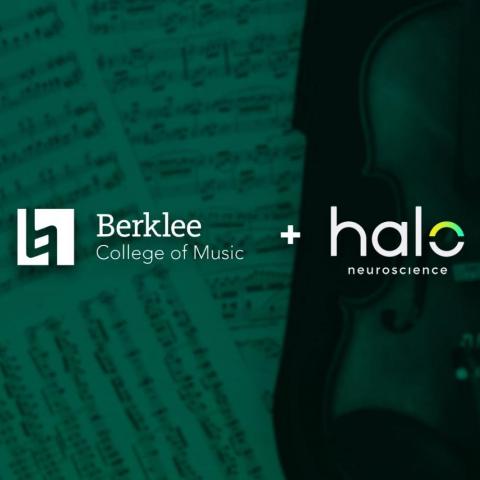Berklee and Halo Neuroscience Partner to Accelerate Music Learning in the Brain

Alyse Brown, a Boston Conservatory at Berklee graduate, used Halo Sport to learn guitar.
What if it were possible to learn music faster, practice more efficiently, and increase creativity just by wearing a special pair of headphones? This summer, Berklee College of Music launched a collaboration with Halo Neuroscience, creators of the Halo Sport headphones, to explore just that. Halo Sport is the first-ever consumer brain stimulator that accelerates muscle memory development. Together, Berklee and Halo are exploring how brain stimulation helps musicians optimize their practice and develop musical technique and creativity faster.
The collaboration between Berklee and Halo Neuroscience stems from a number of recently published neuroscience papers looking at the mechanism in the brain that allows musicians to master the motor skills they need to play the right notes at the right time. These double-blind, placebo-controlled studies show that brain stimulation has the potential to accelerate a musician’s ability to learn musical technique and even foster creativity. Berklee and Halo’s goal is to evaluate the power of brain stimulation in a real-world setting and bring this technology to musicians everywhere.
“We’re excited to have this opportunity to advance our understanding of how musical skills develop in the brain,” said Panos A. Panay, senior vice president for global strategy and innovation at Berklee. “The potential to accelerate music learning and unleash creativity through transcranial electric stimulation, combined with Halo’s beyond-cutting-edge technology, is one of the most exciting things we can bring to the next generation of music makers. Our goal is to explore how brain stimulation can help musicians in ways that were once just a distant pipe dream.”
"With Halo’s technology, I was able to quadruple the number of songs I could write per week."
—Lily Dowling, singer-songwriter and Berklee student
The new collaboration kicked off with a summer fellowship, during which two Berklee students, plus guest participants from Stanford University and Yale University, wrote, practiced, and played music, measuring brain activity and using neurostimulation technology to enhance their productivity and streamline their learning.
Alyse Brown, a summer fellow who graduated from Boston Conservatory at Berklee with a bachelor’s degree in music and a minor in psychology, used Halo Sport to learn guitar for the first time. “With Halo Sport, I was able to face my fears and learn guitar in just eight weeks. I even performed a duet with a friend in front of 50 people at the end of the summer. I’ve gained so much confidence since I started practicing with Halo Sport, and I hope other musicians at Berklee will have the opportunity to benefit from it as well. This could be just the thing that takes musicians to the next level.”

Another student, Lily Dowling, a singer-songwriter currently going into her third year at Berklee College of Music, used a different type of stimulation to improve her songwriting efficiency. “I never thought I would be incorporating brain stimulation into my songwriting process, let alone see such a big difference. With Halo’s technology, I was able to quadruple the number of songs I could write per week.”
Brett Wingeier, Halo cofounder and co-CEO, comments: “We’re thrilled to work with Berklee to improve musicians’ motor skills and accelerate their musical training. The next step will be exploring ways transcranial electric stimulation can affect attention and focus. Recent literature suggests that specific patterns of stimulation applied to cognitive areas of the brain could potentially help unlock more creativity for solos and songwriting.”
Following this summer’s fellowship, the two institutions will look to continue learning how different types of brain stimulation, including transcranial direct current stimulation, transcranial alternating current stimulation, and transcranial random noise stimulation can help musicians increase technical ability, creativity, and focus. Follow Berklee College of Music and Halo Neuroscience on social media to see what the summer fellows accomplished this summer, and learn more at haloneuro.com.
